Technical progress as easy as possible for modern living. Where once stood factories, now, for the most part, there are shopping centers, cinemas and beauty salons. The process of goods production is almost completely mechanized and computerized. And the production sphere is gradually replaced by services. The man, meanwhile, sits for hours in the office trying to come up with another method of effective sales, marketing ploy or the other option of making money from other people's wallets. And then he gets into his car and comfortably, in a comfortable driver's seat coming home. Of course, we painted a perfect picture without referring to the traffic jams, stuffy offices, public vehicles, which enjoys considerable part of the population, etc. But who does not want to live comfortably?
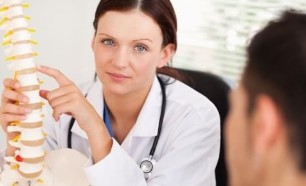
However, what is the use of such comfort? Our century has already been declared the century of inactivity, which entails a lot of unpleasant consequences. Cardiovascular disease, massive obesity, hypertension, sciatica and other ailments are attached with own car, a soft office chair and a private office. But the most common disease that we pay for a sedentary lifestyle, is low back pain. That he will be the focus of this article.
Osteochondrosis
What is osteochondrosis? Consider the mechanism of development and types of disease When we hear about the degenerative disc disease, the first place you think of back pain and muscle. However, the disease directly muscular system is not affected. Pathological changes occur in the cartilage, which exist in all the joints of our body.
Cartilage tissue has a protective and cushioning functions. In addition, it allocates a special secret, which lubricates the joint surfaces, reducing friction during movement of the bones. But in some cases the cartilage wears down (degenerates). In addition, metabolic disorders, lack of certain vitamins and minerals, and also hereditary metabolic malfunctions disturbed nutrition of cartilage tissue, it loses its strength and elasticity. This condition is called kwashiorkor.
So, osteochondrosis – a degenerative-dystrophic changes in cartilage. Theoretically, pathological changes can occur in any joint. But in practice, low back pain often affects our spine. And depending on which part of the spine is localized process, distinguish between lumbar, thoracic and cervical osteochondrosis.
Imagine our spine. It consists of separate bones of the vertebrae. Each vertebra has a body and several processes. Between the body and appendages has a hole, through which passes the cord of the spinal cord. The vertebrae are arranged in such a way that the holes form a hollow tube called the spinal canal. The body of the vertebrae are placed one above the other, and between them are a layer of cartilage – the intervertebral cartilaginous discs. They function as shock absorbers, mitigating the impacts and reducing the load on the spine when walking or other movements of the person. The vertebrae have the same structure, and differ in size. With the exception of a few fused vertebrae sacrococcygeal division and seven elements of the cervical spine,which differ from each other in structure.
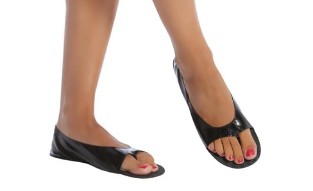
The vertebral column is represented by four departments:
- neck (from 1st to 7th vertebrae);
- breast (8th to 12th);
- lumbar (from 13 th to 18 th);
- sacrum and coccyx (this division consists of the bones still United, and therefore not involved in the pathological process).
Accordingly, osteochondrosis of the spine is divided into three main types that we outlined above.
Types of osteochondrosis
The most common osteochondrosis of the cervical, because cervical vertebrae have different structures and muscles that support the spine, this part is rather poorly developed. Over time, cervical or any other region of the spine a disc of hyaline cartilage starts to harden, losing its elasticity, and the vertebrae approach each other. The result can be a pinched nerve fibers or blood vessels. As a consequence of disturbed innervation and blood supply of the relevant authorities, which leads to irregularities in their work, reduction of motor activity, the appearance of pain syndrome. In addition, when the displacement of the vertebrae, its shoots can irritate the muscle tissue in this region, leading to muscle spasms. But against the background of the disease, muscle machine and so have to work double to compensate for the reduced shock-absorbing function of the spine and changing the position of the vertebral bodies.
Along with the neck, quite common also lumbosacral degenerative disc disease, which develops on the background of regular high loads on your back, weight lifting and so on.
Thoracic osteochondrosis is somewhat less than the first two varieties of the disease. Moreover, its diagnosis is difficult because the disease has a number of nonspecific symptoms similar to the symptoms of angina. Particularly noteworthy is the fact that by themselves the body of the vertebrae, cartilage, nerves, brain and spinal cord is not equipped with pain receptors, and therefore, the pain in osteochondrosis is indirect in nature. Osteochondrosis are also some varieties Osteochondropathy, which have a slightly different etiology. We will mention in our article.
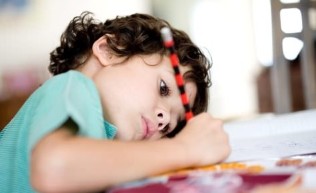
The causes of the disease
With the main causes of development of degenerative disc disease – physical inactivity – we started our story. As they say, movement is life! What about the lack of sufficient motor activity may affect the state of our joints and spine? The thing is that our back has a natural muscular corset that supports the spine and helps him properly to perform its functions. However, in the absence of physical exertion muscles weakened, the spine loses support, the main burden falls on the intervertebral cartilaginous disks, and they eventually undergo degenerative changes.
However, excessive exercise, such as professional athletes, can also lead to degeneration and cartilage degeneration, and hence to trigger the development of osteochondrosis and Osteochondropathy other. Accordingly, in this respect the need to adhere to the Golden mean, in order to avoid health problems.
Important role in the development of degenerative disc disease plays a style of modern life. In addition to the lack of sufficient physical activity, this can be attributed to unbalanced diet, lack of necessary vitamins and minerals in the diet, Smoking, alcohol consumption, use in everyday life and in the workplace the wrong furniture, sleep on a soft mattress, habitual poor posture, driving, working conditions, etcD.
All this inevitably leads to malnutrition of the cartilage, loss of its quality characteristics (strength, elasticity) and the development of osteoarthritis. Flat feet is another quite common cause of low back pain. It would seem, what relation to the deformation of the arch of the foot may have pain in lower back and especially the neck? It turns out that the most direct. The human foot is designed so that it is able to properly distribute the weight of the whole body when walking. In the evolution of the bones of the foot form two arch – longitudinal and transverse. Due to this structure, along with the emergence of physiological curves of the spine became possible human bipedalism. If the arch of the foot for one reason or another is flattened, the entire load is shifted to the spine. And this back pain and limitation of range of motion, and even migraines.
In recent years, many scholars are inclined to the fact that in many ways to the development of osteoarthritis is affected by heredity.
Symptoms of degenerative disc disease
How to recognize degenerative disc disease? Symptoms of osteoarthritis are very diverse. While most of us only know about the main signs of this disease: muscle pain and difficulties in movement. However, we do not knowingly spoke in detail about the mechanism of development of degenerative disc disease. After all, the signs of this disease are directly related to the processes that occur during the development of the pathology.
So, as we already know, the symptoms of degenerative disc disease associated with tight blood vessels and nerve fibers with a subsequent violation of innervation and nutrition of the respective muscles, organs and tissues. So, the pathological changes will concern not only the muscular system. So, symptoms of cervical degenerative disc disease is and frequent headaches, and even dizziness, along with pain in the neck muscles and shoulder girdle.
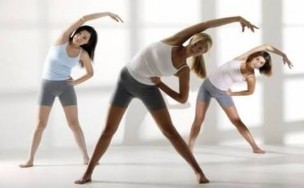
Headache in cervical osteochondrosis has vascular origin: blood flow in the brain is disrupted, and nerve cells experience hypoxia. Also connected with it a dizziness that can sometimes reach up to unconscious States. A blood disorder associated with cervical osteochondrosis, in rare cases, can also cause hearing loss in a patient, violation of movement coordination (unsteadiness of gait), hoarseness of the voice. Snoring can also indicate the development of osteoarthritis.
If degenerative changes affect the spinal discs of the thoracic spines , the degenerative disc disease will manifest with pain in the back of the corresponding localization, accession asthmatic component, heart pains. Sometimes the patient may experience shortness of breath and arrythmia. Often patients confuse the emergence of cardialgia with ischemic heart disease (angina pectoris). But this kind of heartaches, there are still a number of distinctive features. Subjectively they can be perceived like a "number" in the chest. The intake of nitrates and other antianginal funds are not relieves pain. Angina in humans, increased anxiety and even a fear of death. Thoracic degenerative disc disease does not have such symptoms. Sometimes cardialgia caused by osteochondrosis can last a few days, but it does not threaten human life. Coronary heart pain is intermittent, but ignoring them can lead to the development of myocardial infarction, and untimely medical aid at an attack of angina may cause death.
Osteochondrosis of the lumbosacral spine is characterized by pain in the lower back. The pain may radiate to the lower limbs. The patient also may experience difficulty walking, which is associated with a reduction in tone innervated by this segment of the spinal cord muscles. The pains are shooting in nature. Sometimes the patient is difficult to raise the back, get out of bed or change position of the body. Reflexes of the lower extremities osteochondrosis of the lumbosacral reduced.
Osteochondropathy
We have already touched on in this article such a problem, as children's low back pain. The symptoms and treatment of this disease differ from those of adults. This is due, primarily, with the concept of child involves several different osteochondrosis, Osteochondropathy. The most common are:
- disease Keller,
- disease Osgood–Schlatter,
- disease Chairman-May,
- disease Legg-calve-Peters.
Keller disease occurs in children aged 8 to 12 years but can also develop in adulthood, which happens much less frequently. When this disease affects the spongy bone of the foot. Moreover, there are two main types of this disease. Disease Keller the first type affects the navicular bone. If the disease occurs for the second type, pathological changes affect the metatarsal bones.
Schlatter disease affects the tibial bone in the area under the kneecap and developed in the age group 11 to 14 years. Predisposing factors are playing sports (football, basketball, running, jumping, etc.). The emergence of the disease may be the result of discrepancy between the speed of bone growth in adolescents, and development of cartilage.
Disease Chairman-May or curvature of the spine, is one of the varieties of thoracic osteochondrosis. This condition develops usually in children and adolescents aged 8 to 14 years, but for a long time neither the child nor the parents may not notice any major deviations. The visible symptom is the incorrect posture of the child.
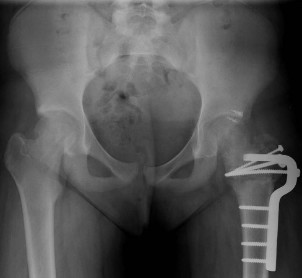
Disease Legg-Calv-Perthes is a disease that affects the thigh bone, or rather its head, in the area of which is cartilage. The disease most often affects kids 4 to 14 years of age and appear limp. In this pathology occur necrotic changes in the tissues of the femoral head, which are non-infectious (aseptic) character. Most often, the cause of the disease is a genetic predisposition. In the early stages, the child begins to limp. Later, the baby has pain in the thigh and knee, especially when driving.
Prevention of osteochondrosis in children is a moderate physical activity, wearing comfortable shoes, correction and maintenance of correct posture, for which there is a special set of exercises. Low back pain and pregnancy of course, if the woman suffers from osteoarthritis, it is planning pregnancy, she must deal with the treatment of this disease. Although completely cure this disease is impossible, since to fully restore the cartilage can not.
Along with sufficient physical activity, moderation and balance in eating will help you to normalize your weight and subsequently keep it under control. Normal weight – the key to your wellbeing and the health of your back. A healthy back is strong and restorative sleep and no headaches, and prevention of other diseases of the musculoskeletal system. Love yourself, pay more attention and take care of your health!































